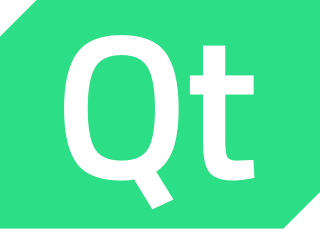
Qt is cross-platform application development framework for creating graphical user interfaces as well as cross-platform applications that run on various software and hardware platforms such as Linux, Windows, macOS, Android or embedded systems with little or no change in the underlying codebase while still being a native application with native capabilities and speed.
The Q Public License (QPL) is a non-copyleft license, created by the company Trolltech for its free software edition of the Qt toolkit and framework. It was used until Qt 3.0, until version 4.0 was released under the Free Software Foundation's (FSF) GNU General Public License (GPL) version 2.

wxWidgets is a widget toolkit and tools library for creating graphical user interfaces (GUIs) for cross-platform applications. wxWidgets enables a program's GUI code to compile and run on several computer platforms with minimal or no code changes. A wide choice of compilers and other tools to use with wxWidgets facilitates development of sophisticated applications. wxWidgets supports a comprehensive range of popular operating systems and graphical libraries, both proprietary and free, and is widely deployed in prominent organizations.

Fast Light Toolkit (FLTK) is a cross-platform widget library for graphical user interfaces (GUIs), developed by Bill Spitzak and others. Made to accommodate 3D graphics programming, it has an interface to OpenGL, but it is also suitable for general GUI programming.

PyQt is a Python binding of the cross-platform GUI toolkit Qt, implemented as a Python plug-in. PyQt is free software developed by the British firm Riverbank Computing. It is available under similar terms to Qt versions older than 4.5; this means a variety of licenses including GNU General Public License (GPL) and commercial license, but not the GNU Lesser General Public License (LGPL). PyQt supports Microsoft Windows as well as various kinds of UNIX, including Linux and MacOS.

X Athena Widgets or Xaw is a GUI widget library for the X Window System. Developed as part of Project Athena, Xaw was written under the auspices of the MIT X Consortium as a sample widget set built on X Toolkit Intrinsics (Xt); Xt and Xaw are collectively known as the X Toolkit. Xaw has been largely superseded by more sophisticated toolkits like Motif, and later toolkits such as GTK, and Qt, but it is still maintained and is available as part of most X Window System installations. The library, like other core parts of X, is licensed under the MIT License.
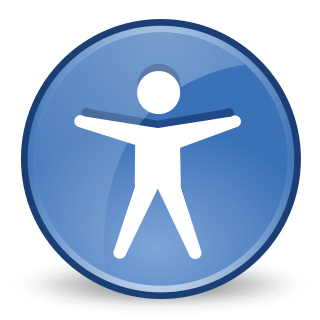
Assistive Technology Service Provider Interface (AT-SPI) is a platform-neutral framework for providing bi-directional communication between assistive technologies (AT) and applications. It is the de facto standard for providing accessibility to free and open desktops, like Linux or OpenBSD, led by the GNOME Project.
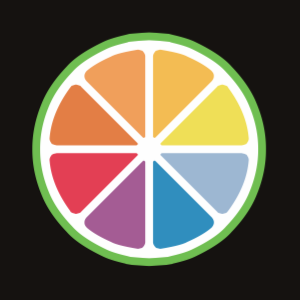
JUCE is an open-source cross-platform C++ application framework, used for the development of desktop and mobile applications. JUCE is used in particular for its GUI and plug-ins libraries. It is dual licensed under the GPLv3 and a commercial license.

fpGUI, the Free Pascal GUI toolkit, is a cross-platform graphical user interface toolkit developed by Graeme Geldenhuys. fpGUI is open source and free software, licensed under a Modified LGPL license. The toolkit has been implemented using the Free Pascal compiler, meaning it is written in the Object Pascal language.
Clutter is a discontinued GObject-based graphics library for creating hardware-accelerated user interfaces. Clutter is an OpenGL-based 'interactive canvas' library and does not contain any graphical control elements. It relies upon OpenGL (1.4+) or OpenGL ES for rendering,. It also supports media playback using GStreamer and 2D graphics rendering using Cairo.

Qt Creator is a cross-platform C++, JavaScript, Python and QML integrated development environment (IDE) which simplifies GUI application development. It is part of the SDK for the Qt GUI application development framework and uses the Qt API, which encapsulates host OS GUI function calls. It includes a visual debugger and an integrated WYSIWYG GUI layout and forms designer. The editor has features such as syntax highlighting and autocompletion. Qt Creator uses the C++ compiler from the GNU Compiler Collection on Linux. On Windows it can use MinGW or MSVC with the default install and can also use Microsoft Console Debugger when compiled from source code. Clang is also supported.

GTK is a free software cross-platform widget toolkit for creating graphical user interfaces (GUIs). It is licensed under the terms of the GNU Lesser General Public License, allowing both free and proprietary software to use it. It is one of the most popular toolkits for the Wayland and X11 windowing systems.
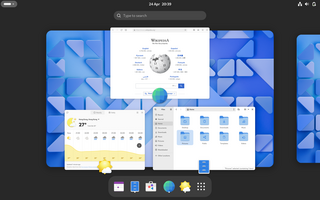
GNOME, originally an acronym for GNU Network Object Model Environment, is a free and open-source desktop environment for Linux and other Unix-like operating systems.

PySide is a Python binding of the cross-platform GUI toolkit Qt developed by The Qt Company, as part of the Qt for Python project. It is one of the alternatives to the standard library package Tkinter. Like Qt, PySide is free software. PySide supports Linux/X11, macOS, and Microsoft Windows. The project can also be cross compiled to embedded systems like Raspberry Pi, and Android devices.

mpv is free and open-source media player software based on MPlayer, mplayer2 and FFmpeg. It runs on several operating systems, including Unix-like operating systems and Microsoft Windows, along with having an Android port called mpv-android. It is cross-platform, running on ARM, PowerPC, x86/IA-32, x86-64, and MIPS architecture.
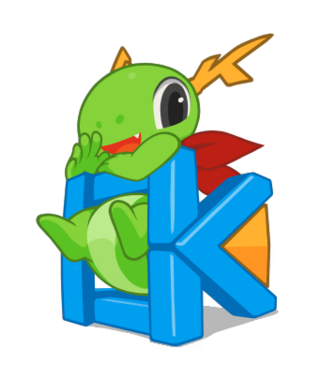
KDE Frameworks is a collection of libraries and software frameworks readily available to any Qt-based software stacks or applications on multiple operating systems. Featuring frequently needed functionality solutions like hardware integration, file format support, additional graphical control elements, plotting functions, and spell checking, the collection serves as the technological foundation for KDE Plasma and KDE Gear. It is distributed under the GNU Lesser General Public License (LGPL).
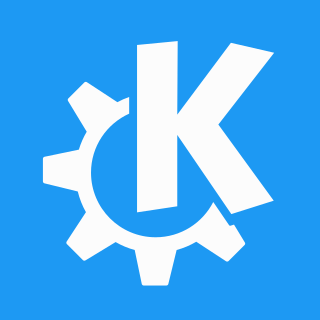
KDE Projects are projects maintained by the KDE community, a group of people developing and advocating free software for everyday use, for example KDE Plasma and KDE Frameworks or applications such as Amarok, Krita or Digikam. There are also non-coding projects like designing the Breeze desktop theme and iconset, which is coordinated by KDE's Visual Design Group. Even non-Qt applications like GCompris, which started as a GTK-based application, or web-based projects like WikiToLearn are officially part of KDE.
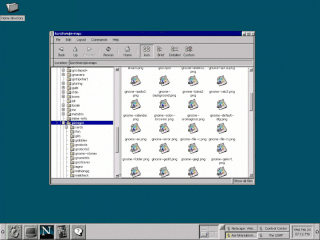
GNOME 1 is the first major release of the GNOME desktop environment. Its primary goal was to provide a consistent user-friendly environment in conjunction with the X Window System. It was also a modern and free and open source software alternative to older desktop environments such as the Common Desktop Environment (CDE), but also to the K Desktop Environment (KDE). Each desktop environment was built-upon then proprietary-licensed widget toolkits, whereas GNOME's goal from the onset, was to be freely-licensed, and utilize the GTK toolkit instead.


















